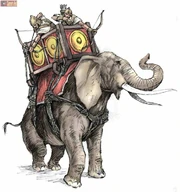David olvera (talk | contribs) No edit summary |
No edit summary Tag: Visual edit |
||
| (5 intermediate revisions by 2 users not shown) | |||
| Line 1: | Line 1: | ||
| ⚫ | The '''War Elephant''' was a cut enemy in ''[[God of War: Chains of Olympus]]'', appearing only in the unlockable video "[[Making of Attica]]" and in the "[[Art Galleries#Outtakes|Outtakes]]" image gallery. In the video, the [[Persian King]] is riding this creature on a small walkway where [[Kratos]] must kill it. |
||
| − | {{Imageneed}} |
||
| − | The '''War Elephant''' was a cut enemy in [[God of War: Chains of Olympus]]. |
||
==History== |
==History== |
||
| ⚫ | |||
| − | |||
| ⚫ | Elephants are powerful working animals. Numerous cultures used them in war, including the [[Persian]]s in their wars with the [[Greece|Greeks]]. The most famous case was at the Battle of the Hydaspes River in 327 BC. Alexander the Great's campaign to reach the Eastern sea failed because his men were terrified of the elephants used by King Porus of Taxilia. Afterwards, during the Punic Wars, the Carthaginian general Hannibal Barca sent an army of 37 elephants across the Alps and nearly destroyed Rome. In 197 BC, the Romans confronted the Macedonian army at Cynosephelae, deploying 20 elephants as part of their invasion force. Although elephants have a bad reputation in antiquity as being unpredictable, they served the Romans extremely well in breaking up numbers of Macedonian [http://en.wikipedia.org/wiki/Phalangite phalangites]. |
||
| ⚫ | |||
| ⚫ | Elephants |
||
| − | |||
| − | |||
| − | re finally defeated at Zama, in North Africa. In 197 BC, the Romans confronted the Macedonian army at Cynosephelae. The Romans deployed 20 elephants as part of their invasion force. Although elephants have a bad reputation in antiquity as being unpredictable, regardless they served the Romans extremely well in breaking up numbers of Macedonian phalangites. |
||
| − | |||
| − | ==In God of War: Chains of Olympus== |
||
| ⚫ | The '''War Elephant''' was a cut enemy in [[God of War: Chains of Olympus]], appearing only in the unlockable video "[[Making of Attica]]" and the "[[Art Galleries#Outtakes|Outtakes]]" image gallery. In the video, the [[Persian King]] |
||
==Related Pages== |
==Related Pages== |
||
| Line 21: | Line 13: | ||
[[Category:Enemies]] |
[[Category:Enemies]] |
||
[[Category:Real Life]] |
[[Category:Real Life]] |
||
| − | [[Category:God of War:Chains of Olympus]] |
+ | [[Category:God of War: Chains of Olympus]] |
Revision as of 01:22, 22 March 2018
The War Elephant was a cut enemy in God of War: Chains of Olympus, appearing only in the unlockable video "Making of Attica" and in the "Outtakes" image gallery. In the video, the Persian King is riding this creature on a small walkway where Kratos must kill it.
History

Elephants are powerful working animals. Numerous cultures used them in war, including the Persians in their wars with the Greeks. The most famous case was at the Battle of the Hydaspes River in 327 BC. Alexander the Great's campaign to reach the Eastern sea failed because his men were terrified of the elephants used by King Porus of Taxilia. Afterwards, during the Punic Wars, the Carthaginian general Hannibal Barca sent an army of 37 elephants across the Alps and nearly destroyed Rome. In 197 BC, the Romans confronted the Macedonian army at Cynosephelae, deploying 20 elephants as part of their invasion force. Although elephants have a bad reputation in antiquity as being unpredictable, they served the Romans extremely well in breaking up numbers of Macedonian phalangites.
